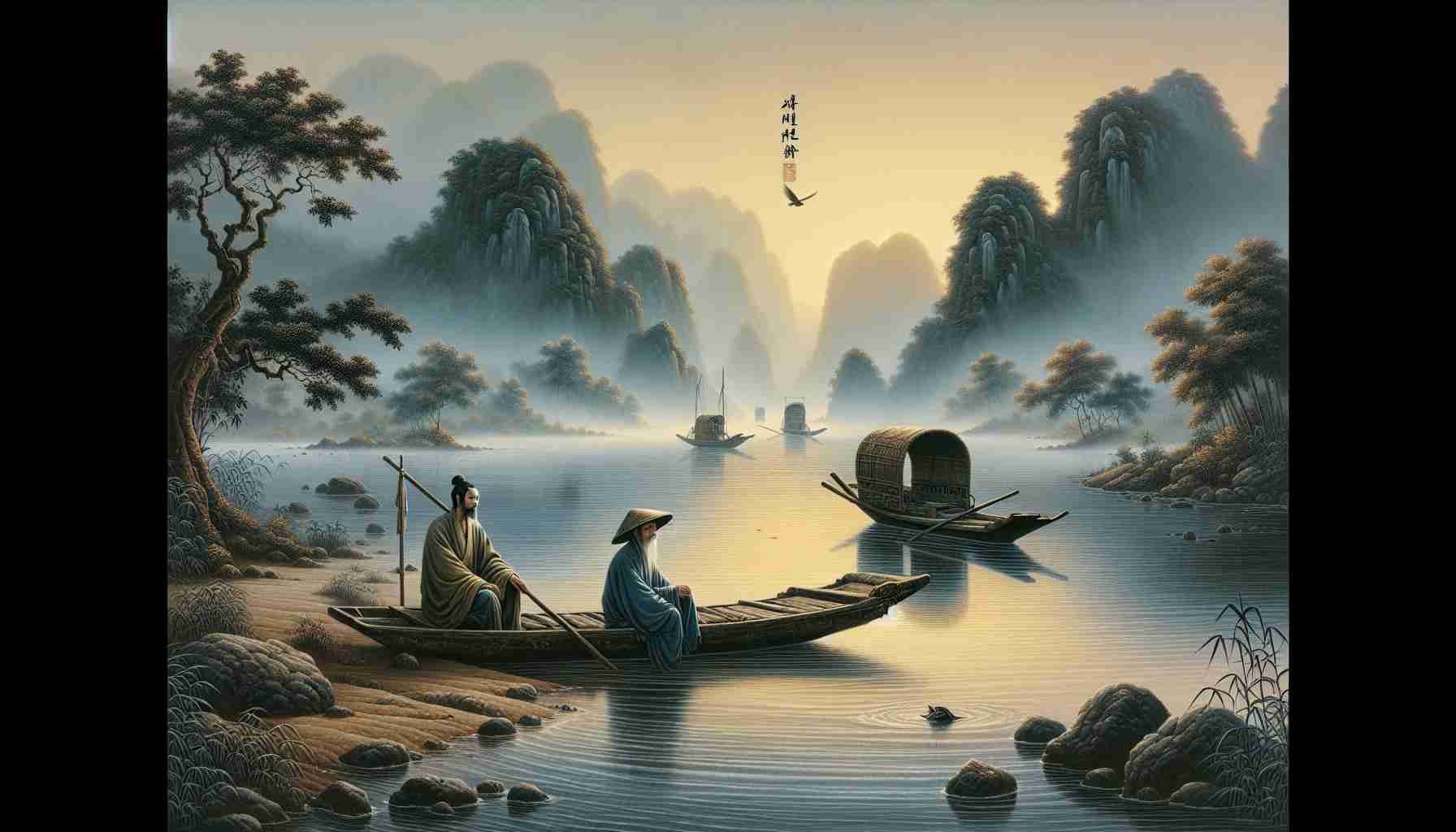

I was just a humble ferryman. Every day, I rowed people across the wide, quiet river that ran through our small village in ancient China. The old wooden boat creaked, and the water sparkled beneath the morning sun. Most days were the same—fishers with their baskets, children chasing dragonflies, and merchants talking all at once.
But one day, something different happened.
It was early. The fog still danced on the river’s surface when I saw it—a small, empty boat slowly drifting toward my dock. No one was inside. At first, I looked around, thinking someone must have jumped out. But no, it was truly empty.
I tied the little boat to the dock so it wouldn’t float away. Then I sat beside it, curious. Soon, an angry man came stomping down the path.
"Where is he?" the man shouted, his sleeves flapping like sails. “That fool hit my boat and didn’t say a word!”
I pointed to the little boat. “There was no one inside,” I said gently.
The man stared, confused. Then, like clouds after a summer rain, the anger in his face melted away.
“Oh,” he said softly. “I see.”
He looked at the boat again. “I was ready to yell at someone, but the boat... it’s just a drifting piece of wood.”
We sat quietly for a while. The river made soft, bubbling sounds. Then I said, “Sometimes, the world bumps into us like that boat. If we yell at everything, we spend our whole lives angry.”
The man tilted his head. “But if we understand that no one meant to hurt us, like this empty boat, maybe we can let it pass?”
I nodded slowly. “That’s the teaching of the Tao—the Way. Things happen. But we don’t always have to push or fight. Like the river, we just flow.”
He didn’t say anything for a while. Just watched the boat.
Later that day, I watched the empty boat drift free again. The ropes had come loose, and it floated gently downriver, bumping softly into the shore, then gliding past. It didn’t fight. It didn’t struggle. It just moved.
That night, I thought about it long after I’d finished ferrying people. All my life, I had worked hard to guide the boat, fight the current, keep control. But the empty boat didn’t do any of that. It still got where it was going.
The next morning, I rowed with a lighter touch. I didn’t grip the oars so hard. I let the water help me.
And something strange happened—I felt more at peace than ever before.
I didn’t stop ferrying people. Life still flowed. But I no longer tried to fight every bump and turn.
That small, empty boat taught me something big.
I didn’t change overnight. But each time the river moved, I remembered: I didn’t always have to steer so hard. I too could float with the Way—smooth, simple, and weightless.
I was just a humble ferryman. Every day, I rowed people across the wide, quiet river that ran through our small village in ancient China. The old wooden boat creaked, and the water sparkled beneath the morning sun. Most days were the same—fishers with their baskets, children chasing dragonflies, and merchants talking all at once.
But one day, something different happened.
It was early. The fog still danced on the river’s surface when I saw it—a small, empty boat slowly drifting toward my dock. No one was inside. At first, I looked around, thinking someone must have jumped out. But no, it was truly empty.
I tied the little boat to the dock so it wouldn’t float away. Then I sat beside it, curious. Soon, an angry man came stomping down the path.
"Where is he?" the man shouted, his sleeves flapping like sails. “That fool hit my boat and didn’t say a word!”
I pointed to the little boat. “There was no one inside,” I said gently.
The man stared, confused. Then, like clouds after a summer rain, the anger in his face melted away.
“Oh,” he said softly. “I see.”
He looked at the boat again. “I was ready to yell at someone, but the boat... it’s just a drifting piece of wood.”
We sat quietly for a while. The river made soft, bubbling sounds. Then I said, “Sometimes, the world bumps into us like that boat. If we yell at everything, we spend our whole lives angry.”
The man tilted his head. “But if we understand that no one meant to hurt us, like this empty boat, maybe we can let it pass?”
I nodded slowly. “That’s the teaching of the Tao—the Way. Things happen. But we don’t always have to push or fight. Like the river, we just flow.”
He didn’t say anything for a while. Just watched the boat.
Later that day, I watched the empty boat drift free again. The ropes had come loose, and it floated gently downriver, bumping softly into the shore, then gliding past. It didn’t fight. It didn’t struggle. It just moved.
That night, I thought about it long after I’d finished ferrying people. All my life, I had worked hard to guide the boat, fight the current, keep control. But the empty boat didn’t do any of that. It still got where it was going.
The next morning, I rowed with a lighter touch. I didn’t grip the oars so hard. I let the water help me.
And something strange happened—I felt more at peace than ever before.
I didn’t stop ferrying people. Life still flowed. But I no longer tried to fight every bump and turn.
That small, empty boat taught me something big.
I didn’t change overnight. But each time the river moved, I remembered: I didn’t always have to steer so hard. I too could float with the Way—smooth, simple, and weightless.